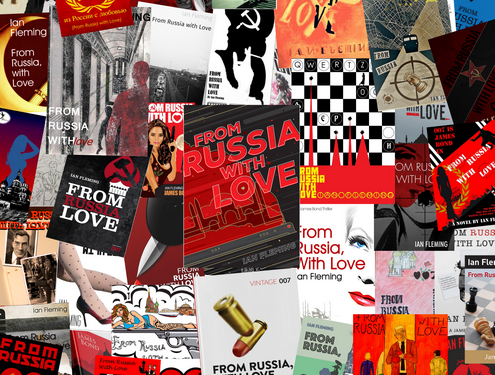The Fleming Reading Challenge continues into the New Year with the next book in the James Bond series, From Russia, With Love. In 1956, Ian Fleming once again retreated to his GoldenEye estate in Jamaica to begin work on his next novel, whilst Diamonds Are Forever was in final edit and production stages. Being the fifth adventure Fleming had penned in only 3 years, as the final draught was nearing completion the author unsurprisingly began to tire of his spy creation and saw a way out with a finale that would be a a definite conclusion to James Bond, whilst also leaving him a door open to return if Fleming felt the desire to.
The plot finds Bond sent to Istanbul to aid in the defection of a Russian cypher clerk, who claims to have fallen in love with him at first sight of his photograph. Although highly suspicious, the defection brings the promise of a Spektor coding machine, which the British cannot pass up on the opportunity to obtain. However the bigger picture has Russian Intelligence SMERSH not only arrange for the cypher clerk, Tatiana Romanova, to pretend that she has fallen in love with Bond but ensnare him in a bigger scandal, which she knows nothing about, with the endgame of their deaths and the ruin of the British Secret Service in the public eye.

For the first time since Casino Royale, Bond finds himself in a fairly believable and realistic scenario, going back to the Cold War with an espionage plot; there is no treasure hunting or diamond smuggling in sight. Instead, Bond must retrieve the Spektor coding device, a Macguffin based on the World War II Enigma Machine, of which the acquisition helps to turn the tide for the Allied Nations. With the war still a recent memory to the world upon publication, readers could identify with and understand the gravity of Bond’s mission. To give the spy story a true feeling of real life espionage, the operations take place in the shadows, as the protagonist slowly puts together the pieces. Real life spies must operate invisibly, and keep their presence hidden, and so Fleming wrote a narrative structure to reflect this, whilst not alienating his audience with a lack of plot.
The three acts of the story set up the trap being laid for Bond, explore his time in Istanbul and then document his escape with Tatiana aboard the Orient Express. What makes From Russia, With Love such a unique experiment is that James Bond does not appear in the first third of the book. Instead we are given a slow burning introduction to the villains of the story, as well as the outline of SMERSH’s scheme to humiliate the British Secret Service publicly. At this point the reader finds out that the plan is to lure Bond with the chance to claim the Spektor machine with a defecting woman, but the details and final goal is kept under wraps, and unfolds as Bond’s mission goes on. Spending so much time with the villains’ introduction fully fleshes the characters out, so that we invest in them early on, as once Bond is introduced the story focuses on his point of view only. The villains return to face Bond in the climactic chapters, but they are operating behind the scenes in the second act at all times, and not even alluded to.
Although many officers of SMERSH make an appearance via the committee forming the Spektor plot, it is undoubtedly Colonel Rosa Klebb who is the main villain. Even though it is not her own plan, she is delegated the command of the mission. Klebb is a fairly thinly developed character, but what there is makes for her being memorable, as Fleming describes her as odiously as possible. Her appearance is offered referred to hyperbolically as animalistic, such as her “toadlike” face and yellowing eyes, and her vile nature is established through stories of her takeing pleasure in torture and interrogation. Klebb’s standout moment is clearly the recruitment of Tatiana, where she uses her rank and reputation to intimidate the young woman, whilst plying her with champagne and chocolates, and interrogating her about her sexual history. All this before changing into a see-through negligee and attempting to seduce Tatiana, much to her horror.

And under Klebb’s command is SMERSH’s chief executioner, Donovan Grant. With possibly the richest and most intriguing backstory of any Bond villain, having developed mental health issues as a child, in sync with the lunar cycle, that creates a bloodlust within him. We are given a detailed account of how as a child he begun strangling animals and escalated to murdering the homeless, all in effort to control his manic depression. Disappointed by the lack of opportunities for killing serving in the British Army, Grant defected to Russia. After a period of interrogation to determine if the defection was genuine, Grant was retrained and rose through the ranks to become SMERSH’s most valued killer. Grant is established quickly as the antithesis of James Bond, not just as simply as his blonde hair is opposite to Bond’s black hair, but Grant is often silent and asexual compared to Bond’s talkative and promiscuous nature. The character is introduced at his villa, visited by his private masseuse. Fleming establishes Grant through the masseuse’s thoughts, describing his physical fitness, but also explaining how after months of her visits, he has never spoken a word to her. The ominous figure and terrifying character of Grant is built up so high, that his the third act reappearance, aboard the Orient Express under the guise of Bond’s ally, appears different to the character that was established in the early chapters. Everything about Grant being a calm and quiet killing machine is now apparently forgotten, as he begins to gleefully monologue the plot to Bond, so the reader knows the full scheme, and Fleming can quickly wrap up the story. Despite this, the final scene between Grant and Bond is incredibly tense and among some of the best of Fleming’s writing.
Bond himself is very pedestrian throughout the book when he finally does appear; although clearly still the protagonist and hero, he has a more hands-off approach and defers to his contact in Istanbul, and the readers’ source of exposition, Darko Kerim, Head of Station T. With a past involving the circus and links to gypsies, Kerim is a larger than life character that leaps out of the page at you. The reader warms as quickly to him as Bond does, and his years of service for Britain in Istanbul help him to credibly explain how they are fighting the Cold War in this land foreign to Bond; these dialogue heavy moments feeling like expository because of the charm that Kerim exudes . Despite his warm, fatherly demeanor, there are still some aspects the Kerim’s character, specifically related to his gypsy background, that will leave you awkwardly shocked about whether you are supposed to be supporting the character or not; a moment when Kerim fondly remembers keeping a nude woman chained under his table was problematic even in the 1950s.

In terms of Bond’s romantic lead, Tatiana Romanova is an underdeveloped character, especially when compared to the improved writing Fleming had had with female leads like Gala Brand and Tiffany Case. There is a seed of a character early on; exploring her devotion to duty, naivety and inexperience, as well as her belief that love and sex always go hand in hand. Alas, any chance for Tatiana to learn and develop her beliefs never comes, even after being used by her country as a disposable asset prostituting herself for her country. Late in the story, when she finally meet up with Bond, she is as much a Macguffin to drive the plot as the Spektor machine is. Her character does not grow from her experiences with Bond and she has little impact making herself memorable to either the reader, or Bond himself.
All in all, despite the story being less of a pulp adventure than the last three novels, and thete being less action for Bond take part in, From Russia, With Love is a very interesting and enjoyable read. Going back to the roots of what a spy story should be, Fleming’s gamble of holding his hero back for the first act pays off. With each passing chapter, the reader is engrossed more until Bond’s arrival. We get to spend time with a pair of intriguing villains, and there are enough breadcrumbs of information laid down to us to feel the tension of Bond’s predicament, but not enough to spoil the surprises of scheme as it unfolds to its climax. Although Fleming may have begun to tire of the character of James Bond, the public had not. Even with Bond taking a back seat for most of the mission, he stepped up for a thoroughly iconic showdown of wits with Grant in the finale, and the cliffhanger whetted appetites to see what happens next. Luckily, the ambiguous ending left the door open to continue, as after From Russia, With Love was named as being one of President John F. Kennedy’s top 10 books, James Bond’s popularity in America began to skyrocket.

